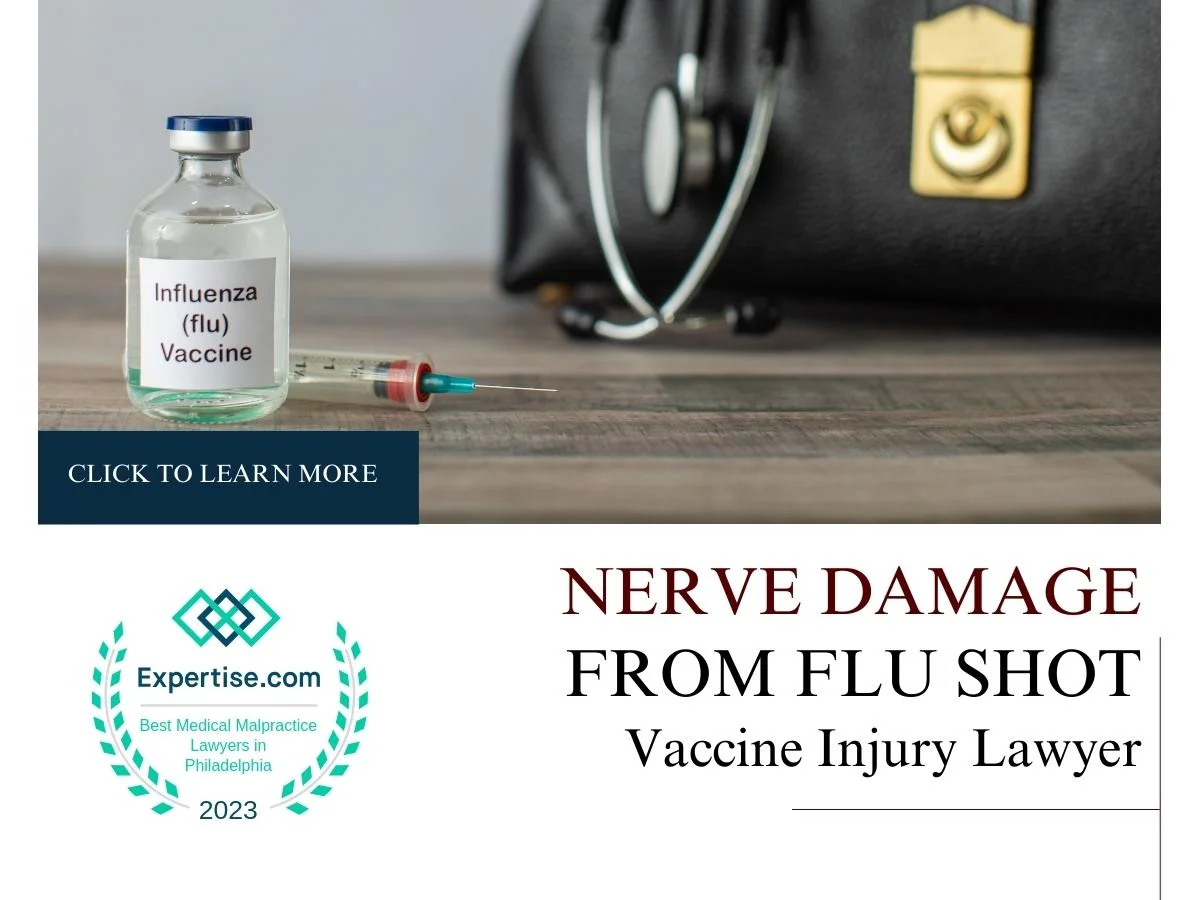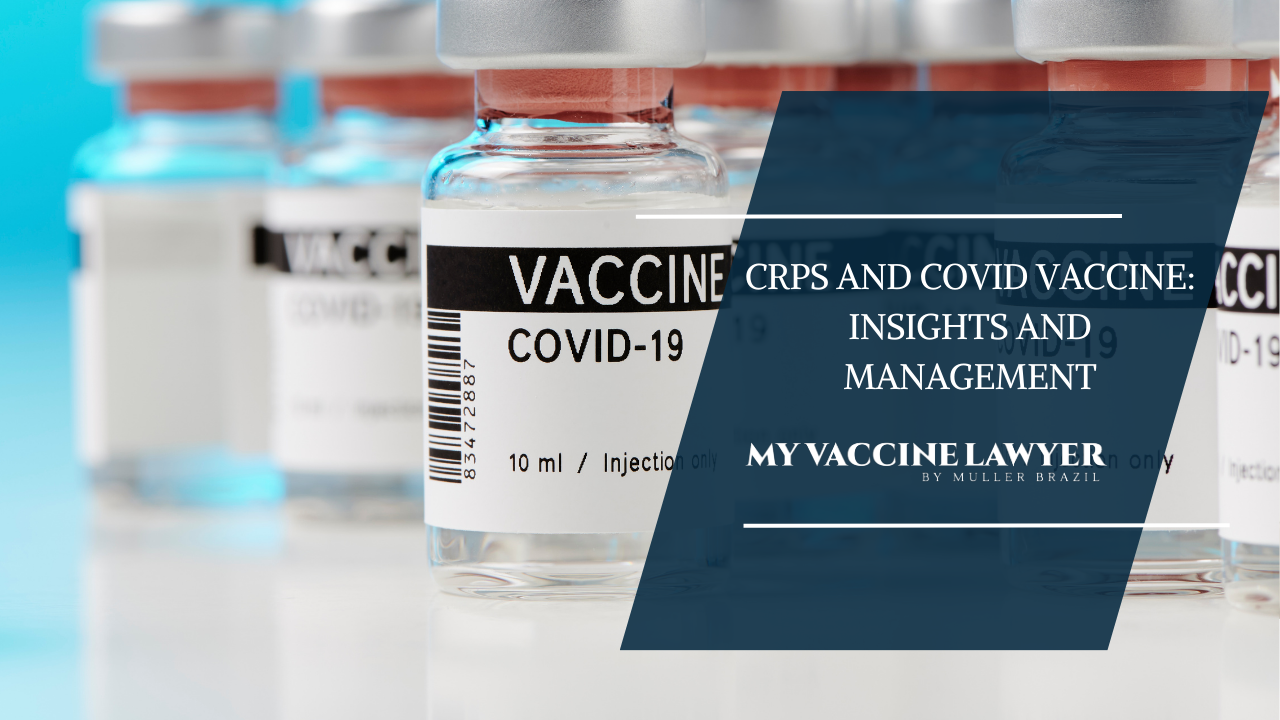Flu Vaccine Side Effects: Understanding Nerve Damage
Millions of people get nerve damage after the flu shot each year. If you experience pain, numbness, or weakness after a flu shot, it could be...
About Us
Vaccine Injury Lawyer
Types of Injuries
All Covered Vaccines
11 min read
Vaccine Injury Law Resources / Leigh Finfer / Recognizing Vaccine-Induced Brain Injuries: Key Facts
 Leigh Finfer
:
Jun 22, 2023 12:00:00 PM
Leigh Finfer
:
Jun 22, 2023 12:00:00 PM
A brain injury is defined as any damage to the brain that impacts a person's physical well-being, emotional state, or behavior. The injuries are usually labeled as traumatic or non-traumatic, indicating whether the injury originates from an external force or not.
More than 5.3 million individuals in the United States live with a permanent brain injury-related disability, according to The Brain Injury Association of America. That's one in every 60 people!
Most people are fairly aware of the inherent dangers of brain injuries, and there is a sense of good feeling about the general level of education regarding instances of potential risk. Unfortunately, regarding vaccine brain injuries, there are doubts about serious side effects from vaccine administration, mainly owing to the scientifically dismissed claims of autism developing from the Measles, Mumps and Rubella (MMR) vaccine. The debacle from this incident has had profound effects where studies show that it is extremely likely that vaccines are causing more neurological damage than currently appreciated, according to Breggin, Peter R.' Moving Past the Vaccine/autism Controversy - to Examine Potential Vaccine Neurological Harms.' 1 Jan. 2021: 25 – 39.
A vaccine-caused brain injury is a potential consequence of receiving a vaccination. In rare cases, like encephalitis, there may be an inflammation of the brain which can lead to some nasty symptoms like headaches, a stiff neck, seizures, and even mental confusion. Although the risks of acquiring a brain injury from a vaccine are very low, they can be debilitating and life-changing.
Individuals concerned about vaccines causing brain injuries raise questions about how vaccines can enter the brain and trigger neurological conditions. It's crucial to recognize that our brains are safeguarded by a protective barrier known as the blood-brain barrier (BBB), which protects against foreign substances entering the brain.
The BBB is a protective membrane that separates the brain from the rest of the body. It consists of tightly linked cells that form barriers called "tight junctions," preventing substances from passing through and entering the brain. The BBB acts as a gate, allowing essential nutrients like glucose to cross into the brain while keeping out pathogens and harmful substances.
The BBB restricts the passage of immune cells, helping to prevent brain inflammation. However, in cases where pathogens damage the BBB, these organisms can enter the brain, leading to Meningitis (inflammation of the meninges) and Encephalitis (inflammation of the brain). These serious conditions may result in permanent brain damage, often requiring hospitalization or death.
It is important to note that vaccine components would need to overcome the protective barrier of the BBB to affect the brain. The BBB is designed to prevent the entry of foreign substances, reducing the likelihood of vaccines reaching the brain and causing neurological conditions.
There are increasing volumes of studies and research to demonstrate that some vaccines can cause brain injuries. Living in a data-centric society permits an easier exchange of knowledge, so our understanding of the potential risks from vaccinations is better than ever. For a complete reference, The Vaccine Injury Table provided by the Vaccine Injury Compensation Program (VICP) has a systematic breakdown of the potential symptoms and time frame.
The following table shows vaccine brain injuries and the responsible vaccine:
|
Injury |
Vaccines potentially causing this |
|
Encephalitis/Encephalopathy |
|
|
Influenza COVID |
|
|
Influenza DTaP MMR |
|
|
Influenza Hepatitis B MMR |
As mentioned above, the MMR vaccine may have been categorically disproven regarding its potential to cause autism, but more than sufficient evidence exists to link it to Encephalitis.
Contrary to this, a study on the potential risk of brain injuries after receiving the pertussis vaccine dismissed the notion, according to 'Gerald S. Golden, Pertussis vaccine and injury to the brain.' Although the study notes the increased risk of convulsion, no consistent neuropathological findings suggested brain injuries were a direct causal link from immunization.
There have been many rumblings and divisions surrounding COVID-19 vaccinations, including the potential for vaccine brain injuries. One such case of Encephalitis after a booster shot of Moderna COVID-19 was presented. In another study, research reveals that although Encephalitis is an uncommon complication of COVID-19, when present, it results in significant morbidity and mortality, according to 'Siow, I., Lee, K. S., Y. Zhang, J. J., Saffari, S. E., & Ng, A. (2021). Encephalitis as a neurological complication of COVID-19: A systematic review and meta-analysis of incidence, outcomes, and predictors. European Journal of Neurology, 28(10), 3491-3502.' Severely ill COVID-19 patients are at higher risk of suffering from Encephalitis as a complication of the infection.
We encourage everyone to keep updated about the latest research and findings.
Different injuries and syndromes will have different effects on each individual. However, there are some consistent symptoms to look out for to help identify these unfortunate cases.
Encephalitis usually starts with flu-like symptoms, such as a high temperature and headache. More serious symptoms come on over hours, days, or weeks, including:
Guillain-Barré Syndrome (GBS) often starts in your feet and hands before spreading to your arms and legs. (CIDP is considered a chronic version of GBS and, thus, has similar symptoms).
At first, you may have:
Chronic Inflammatory Demyelinating Polyneuropathy (CIDP) diagnoses can be challenging as they lead to confusion with Guillain-Barré Syndrome (GBS) due to similar symptoms. However, if symptoms persist for more than eight weeks, healthcare providers may start considering CIDP as a potential diagnosis.
Acute Disseminated Encephalomyelitis (ADEM) symptoms manifest rapidly. Initially, your child may experience fatigue or irritability. It is also common for a viral illness accompanied by fever to precede the onset of symptoms by a few days to a few weeks. Additional symptoms may include:
The location of the inflammation (swelling) within the brain and spinal cord determines what symptoms occur.
Infants and children with brain injuries generally have a poorer prognosis than adults with similar injuries. Since their brains are still developing, there is a chance that a baby's or child's brain can adapt and recover well from an injury. However, brain growth and development disruptions can result in irreversible damage in most cases.
In contrast, assessing the extent of damage in adults who experience brain injuries is usually simpler. Adults already have an established personality, with a known baseline of their physical and mental abilities.
Effects of Brain Injury on Babies/Children:
Physical Impact: Motor skills may be limited or absent, potentially delaying important developmental milestones such as crawling, walking, reaching, grasping, and speaking.
Emotional Impact: Children may experience depression, frustration, anger, or denial as they cope with the changes caused by the injury.
Social Functioning: The child's ability to interact with others may change, making engaging in socially appropriate behaviors more challenging. Learning/Memory - Short-term memory can be significantly impaired, affecting the child's ability to retain and recall information.
Functional Skills: Children may struggle with tasks involving focus, planning, multitasking, and other mental processes necessary for completing tasks efficiently.
Educational Achievement: These impairments can substantially hinder a child's academic pursuits.
Effects of Brain Injury on Adults:
Impaired Cognitive Skills: Adults may experience difficulties performing previously mastered skills and tasks, such as reading, writing, and problem-solving. They may exhibit slower speech and thought processes.
Mood/Behavior: Adjusting to changes in mood and behavior can be particularly challenging, as it can feel like the injured person has become a different individual. Mood swings and behavioral issues can lead to anger, frustration, and depression for the person with the brain injury and their loved ones.
Senses/Perception: Vision problems, including blurred sight and reduced depth perception, are common. There can also be a disconnect between perception and comprehension. Hearing, touch, taste, and smell may become more or less sensitive and acute.
Regardless of age, we recommend seeking medical advice immediately if you notice any of these symptoms in a loved one.
As individuals age, the risk of acquiring a brain injury increases, regardless of whether they already have it. In Canada, older adults (60 years or older) account for 29% of all head injury hospitalizations, according to Brain Injury Canada. The highest rates are seen in those aged 85 and older. Both males and females have similar rates.
Recovery after acquired brain injury is significantly influenced by age. Older populations tend to have greater long-term effects and poorer prognosis, including higher mortality rates, worse functional outcomes, and a need for more rehabilitation.
Effects of brain injury on the elderly are:
Regardless of age, we recommend seeking medical advice immediately if you notice any of these symptoms in a loved one.
Acquired Brain Injuries (ABIs), which include non-traumatic brain injuries like vaccines, can significantly impact cognitive function, language skills, memory, attention, and information-processing abilities. Studies show that these impairments can result in partial or total disability, hindering a functional and psychosocial recovery in the long term, according to ‘Giustini A, Pistarini C, Pisoni C. Traumatic and nontraumatic brain injury. Handb Clin Neurol. 2013;110:401-9. doi: 10.1016/B978-0-444-52901-5.00034-4. PMID: 23312659.’ This situation harms clinical outcomes, social well-being, and economic stability. Furthermore, the social costs associated with disability or loss of life due to ABIs are substantial, and healthcare systems bear considerable financial burdens, ranking among the highest expenses in Europe.
Healthcare providers employ various tests and measures to diagnose Brain Injuries. These assessments help determine the extent of the injury and guide treatment and recovery plans. Imaging tests, such as CT scans and MRIs, provide detailed brain images to detect bleeding, inflammation, or other damage. Additional tests include evaluations of speech and language, social communication skills, swallowing abilities, breathing function, cognition, and neuropsychological assessments. The Glasgow Coma Scale (GCS) is used in the unlikely event that a patient experiences unconsciousness attributed to their injury. It assesses a person's ability to speak, open their eyes, and move, assigning a score indicating the injury's severity.
Determining whether a vaccine caused a brain injury is difficult to prove conclusively. If you suspect a vaccine may have caused a brain injury, it is essential to seek medical attention. If you have doubts or concerns without requiring urgent attention, you can always compare the onset of your symptoms with the details provided by the Vaccine Injury Table. For example, Suppose you received the MMR vaccine and are experiencing some symptoms synonymous with Encephalitis. In that case, you can check whether these symptoms match 5-15 days after vaccine administration.
Thorough medical evaluations are required to prove a vaccine is responsible for any injury suffered. We at My Vaccine Lawyer recommend that if you have even the slightest concern over a potential brain injury for yourself or a loved one, reach out for assistance. When it comes to brain injuries, time is precious!
Early detection and prompt treatment are crucial for the survival of encephalitis patients. A multidisciplinary team of specialists plays a significant role in providing optimal care. Patients may require intensive care unit (ICU) monitoring in severe cases to address potential complications like seizures, brain swelling, respiratory failure, or heart rhythm changes.
The treatment for Encephalitis depends on the underlying cause and symptoms. It may involve:
The specific treatment approach will be determined by healthcare professionals based on individual circumstances and diagnostic findings.
There is no known cure for GBS. The goal of treatment is to prevent breathing problems and relieve symptoms. You will need to stay in the hospital for treatment. Medicines are used to control pain and other conditions that may be present.
Some treatments that may be required are:
Other therapies include hormonal and physical therapy (to increase muscle flexibility and strength).
Through research, new treatments for GBS are continually being identified.
Treatment for CIDP is often effective. Some studies show that up to 80% of people respond well to therapy, according to John Hopkins Medicine. Because it is an autoimmune disorder, doctors use medicines that suppress your immune response to treat CIDP. Your medical team tailors your treatment to you and closely monitors your progress. Treatments for CIDP include immunosuppressive drugs, steroids, intravenous immunoglobulin, and plasma exchange (plasmapheresis) to remove immune system proteins from the blood.
Medications are used to reduce the inflammation in the brain and spinal cord. The main medication used for ADEM is methylprednisolone (Solu-medrol), a corticosteroid given by IV once a day for three to five days, according to the Boston Children’s Hospital.
Determining whether a vaccine caused a brain injury requires a thorough evaluation by medical professionals. If you suspect that a vaccine may have caused a brain injury, follow these steps:
Remember that the evaluation process should be conducted by medical professionals who can thoroughly assess your case based on your specific medical history and circumstances.
You have legal rights if you believe you have suffered a brain injury due to a vaccine. By filing a claim through the VICP, individuals can seek compensation for pain and suffering, lost wages, and medical expenses.
Any person who received a covered vaccine and believed they were injured as a direct result can file a petition. Parents, guardians, or legal representatives can also file on behalf of others. The litigation process involves filing a petition, medical review, legal analysis, and presentation of evidence to a court-appointed special master. Decisions can be appealed, and individuals can file a civil claim against the vaccine manufacturer or administering entity if rejected.
In specific cases, you can sue vaccine manufacturers if they were negligent in producing the vaccine or failed to provide sufficient warnings about possible side effects. However, it is important to note that suing vaccine companies directly is impossible in most situations.
Determining the value of your claim can be complicated. The main factors are the nature and details of the injuries and the pain or suffering accompanied by the potential loss of earnings. There is no definitive formula for determining a case’s value, but your attorney will work with you so you understand the full extent of potential damages from the VICP in your case.
The Vaccine Injury Compensation Program (VICP) is an alternative no-fault program that does not require proof of negligence from the vaccine manufacturer. You simply need to demonstrate that the vaccination caused your injury.
Funding for the program comes from a tax imposed on vaccines, such as the MMR vaccine. Each dose manufactured by a pharmaceutical company is subject to a 75-cent excise tax. The funds collected are deposited into a trust fund, which is used to administer the program and provide compensation to vaccine injury victims, including those who have experienced adverse events like shoulder injuries. Currently, the trust fund holds over 4 billion dollars.
Our team of skilled attorneys has had some spectacular results, including a payout of $4.2m for a vaccine brain injury for a client who suffered Encephalitis after a TDaP shot.
Another client we represented in a flu shot vaccine case won $5.2M after being diagnosed with Guillain-Barre Syndrome.
My Vaccine Lawyer has assisted numerous clients, similar to yours, in securing settlements and verdicts totaling millions of dollars, all without any cost to them. We firmly believe nobody should face the intricate process of filing a vaccine injury claim alone. Our attorney fees are covered by the U.S. Court of Federal Claims, ensuring that you won't incur any expenses when working with us. We handle the entire vaccine injury claim process on your behalf, allowing you to prioritize what truly matters – taking care of yourself or your loved one affected by a vaccine injury.
Leigh A. Finfer is a vaccine and personal injury attorney at Muller Brazil and My Vaccine Lawyer. Mrs. Finfer has been with the firm since June 2018 and her practice includes representing vaccine injury victims, personal injury victims, and those who suffer injuries as a result of unsafe drugs and medical devices.

Millions of people get nerve damage after the flu shot each year. If you experience pain, numbness, or weakness after a flu shot, it could be...

The National Organization for Rare Disorders states that Complex Regional Pain Syndrome (CRPS) affects approximately 200,000 individuals in the...

Developing adhesive capsulitis, or "frozen shoulder," after a vaccination, can be painful and limit your movement. This condition occurs when the...
